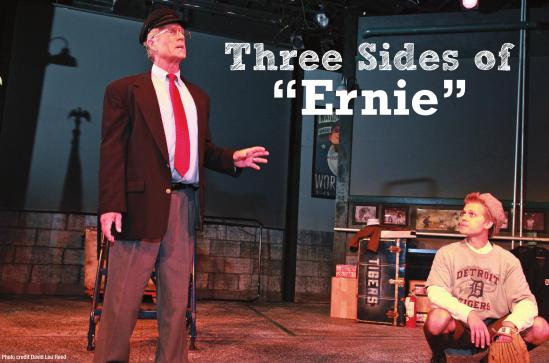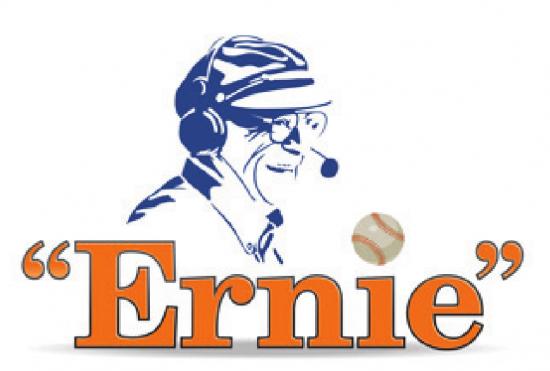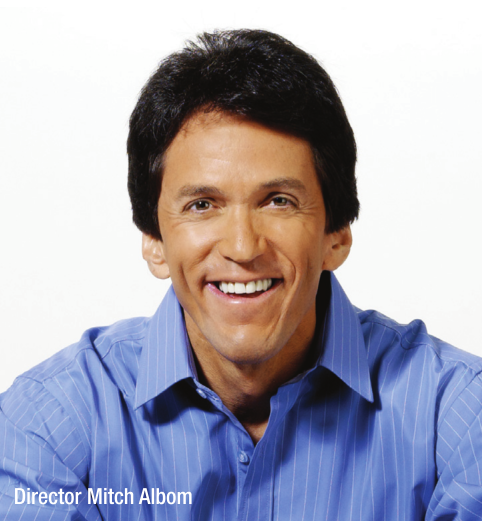Three Sides of “Ernie”

Ernie Harwell was a sportscasting legend. He spent 55 years on the microphone – 42 of those with the Detroit Tigers – calling the game action on radio and TV.
But to Michiganians, he was even more. Harwell’s familiar vocal resonance, phrasings and personality made him more like a family member, connecting him with fans, players and fellow broadcasters.
Harwell grew up in Atlanta, Georgia, and was a ball boy for the Atlanta Crackers as a kid. One day, he met Babe Ruth at a baseball exhibition. Babe Ruth was leaving the field and Ernie yelled after him, "hey how 'bout an autograph?" Ruth actually turned around and came back, but Ernie didn't have anything.
Ruth said, "well, what do you want me to sign? You don't have a program or paper or anything?" So, Ernie stuck out his foot and said, "sign my shoe."
From then on, he had the baseball bug and, by age 25, he was announcing games for the Crackers on WSB Radio. After broadcasting for the Dodgers, Giants and Orioles, he carried some of that accent with him up to the Motor City ("Detroit Ti-gahs" was one pronunciation of note). His trademark phrases developed naturally and then stuck, like "That one is looooong gone!" when there was a home run. They became a Detroit summer tradition.
Harwell was honored by placement in several halls of fame, including the Baseball Hall of Fame in Cooperstown, New York. In January 2009, the American Sportscasters Association placed Harwell on its list of the Top 50 Sportscasters of All Time. A little more than a year later, The Voice of The Tigers was gone at age 92.
In the play "Ernie," penned by Mitch Albom and starring actor Peter Carey in the title role, Harwell's legacy lives on, his stories both rekindling memories of the good old days and reaching a whole new generation.
THE PLAYWRIGHT

Mitch Albom is the bestselling journalist, sports writer and author whose books have sold more than 35 million copies worldwide. The best known of these works is
"Ernie listened to baseball on a transistor radio," Albom said.
"He was with baseball from Babe Ruth to the internet era, from the New York Giants in 1950 to the ’68 World Series and beyond – all those big baseball moments. So the play does that too."
"Tuesdays with Morrie," which also became a TV movie and a play.
"Ernie" may be considered one of Albom's biggest accomplishments, although his original aspiration for the project was simply to pay tribute to his friend of a quarter century.
"Ernie and his friend and manager Gary Spicer had me over to his house a year and a half or so before he died, and they asked me about a screenplay," Albom recalled. "Ernie was very humble about the whole thing.
Not long after that, he [Harwell had cancer] started getting worse. So he didn't have time to be part of it."
Harwell's story seemed ripe for a film, similar to such beloved baseball movies as "Field of Dreams," but Albom had other ideas.
"I never really thought a movie was the place for Ernie's story," he explained. "Movies tend to be about superheroes and explosions and sex. Plays are about dialogue, and Ernie was about dialogue, so I thought, hey, this might be the way to go."
Albom began working on the script for a stage play. Partway through, he realized that Harwell's life paralleled the growth of baseball in America.
"Ernie listened to baseball on a transistor radio," Albom said. "He was with baseball from Babe Ruth to the internet era, from the New York Giants in 1950 to the ’68 World Series and beyond – all those big baseball moments. So the play does that too."
During the play, Harwell shares the story of his life, as several screens at the back of the stage show footage from whatever era he is discussing.
"It's kind of like his stream of consciousness is being projected up behind him," Albom said. "So it's a century's worth of Ernie's life and of baseball."
The play debuted in April 2011 at Detroit’s City Theater, one block from Ernie's broadcast home of Comerica Park. Early on, Albom insisted the play stay in Detroit.
"A little of that was just me being stubborn," Albom said. "I mean, when I first wrote the play, nobody wanted it. So I had to do everything myself: find the theater, the actors, the costumes, the MLB footage. We initially thought it would run for three weeks and that would be it."
Then Albom started getting calls to take the play to New York, Florida and Georgia.
"So I got like, "˜well, where were you?’" he said. "Come to Detroit if you want to see it! I was a little defensive about it. Then I changed my approach because I realized that Ernie didn’t belong to Detroit. He belonged to Michigan. You could listen to him just as well in Traverse City as you could in Detroit."
Part of Harwell's enduring popularity comes from the fact that he was well known for being genuinely nice.
"He defines "˜to know him is to love him,’" Albom said. "Here was a guy who thought that being kind was better than being right."
Everyone also knew that the modest Harwell didn't like to have a fuss made over him. So what would he think of "Ernie," the play?
"Well, it’s not for me to guess what he would think," Albom said carefully. "When Lulu [Harwell's wife of 68 years] saw it, she said, "˜oh, that’s him’ and his dear friend Gary Spicer said the same."
"But I feel good about it. I was his friend for 25 years, so it had to pass that test. I didn't write it as a business; I just wrote it out of friendship. So, I hope he would've liked it, but I have to take that on faith."
THE ACTOR

Peter Carey is an actor and voice talent known for his radio work at stations in Detroit and Indiana, as well as small roles in films like "Reel Steel," Gerard Butler’s "Machine Gun Preacher" and "Scream 4."
Carey understudied the role for two years before taking it on full time in 2014, but he’d been connected with Harwell even before "Ernie" hit the stage.
"I’ve always been a fan of Ernie Harwell," Carey said, "and we actually did a film together called "˜Tigertown,’ a Roy Scheider TV movie. We got to know each other working on the film."
They also did some commercial work together, keeping their friendship and business connection going throughout the years.
When Will Young, the actor who originated the role of Ernie, stepped down, Carey's experience both as an understudy and as a friend of Harwell came into play.
"So there I was, coming off of the bench and stepping up to the plate," Carey said.
The role itself was a challenge, as Carey didn’t want to do an impersonation or an impression, but some of the details were still important, like dropping certain syllables in his speech.
But first, you want to honor the man, Carey affirmed.
"I fortunately have a speech timbre that is similar to his and, after working with him, I knew some of his mannerisms. Ernie always came from a place of fun and appreciation, so when you approach it that same way, you get a lot more out of the character. That was the essence of Ernie Harwell; if you were with him, you were his best friend, the most important person in the room. He was one of the most sincere people I’ve ever met."
Albom has struck gold twice with the two actors who have played Harwell so far.
"I think Peter's fantastic," he said. "We were really blessed to have Will when we started, so I thought we’d never get that lucky again, but Peter is just incredible. There are times when I turn my head and I think Ernie is speaking. He’s got his cadence, his tone, the way he moves and holds his hands."
Like Albom, Carey feels he’s paying tribute with the role.
"I'm honoring a man I admired growing up – as a kid and then as a broadcaster," he said. "So to portray him on stage now is a thrill and a gift."
THE PLAY
The play is set in 2009 during Harwell’s last night in Comerica Park. He’s about to retire and give a speech to a city so far from where he grew up in Georgia, yet so much a part of him, and he of it.
Albom started writing "Ernie" as a one person play, but decided it didn’t fit Harwell.
"It was too much like a lecture," he explained. "All theater has to have conflict and all good plays are about someone wanting something from somebody else."
The trouble was, Harwell was a man remarkably free of conflict.
"He had no ego, never got in a fight," Albom said. "The only time I’d ever seen him troubled was that last night, when they fêted him. So I thought, how can I use that for this play?" "Ernie is in the tunnel under the park, getting ready for his speech, but he doesn’t really want to do it," Carey added. "He did want to say goodbye and thank everybody, but true to form, he didn't like people making a fuss."
So Albom invented a boy from the 1930s who would become Harwell’s foil.
"The Boy became the Roadrunner to Ernie's Coyote," Albom laughed. "He’s everywhere, he’s asking questions, bouncing around and keeping Ernie on his toes, so Ernie never questions why The Boy’s there."
"I love this," Carey said. "Mitch does such a great job telling the story of Ernie's life, framing it with this magical boy who prods Ernie to go through the 'nine innings' of his life story."
The Boy is played by TJ Corbett, a Michigan actor and Artistic Director of Hole in the Wall Theatre Company.
The Boy, Albom adds, comes to represent the everyday fan in the crowd, asking every question you’d want to know about Ernie.
Albom's own conflict over how to move the script along, to honor the man and his friend, had been solved simply by having Ernie do what he'd always done best – talk.
"Ernie" will run Aug. 12-16 at the City Opera House in Traverse City. For tickets and more information, visit cityoperahouse.org or call 231-941-8082.
View On Our Website